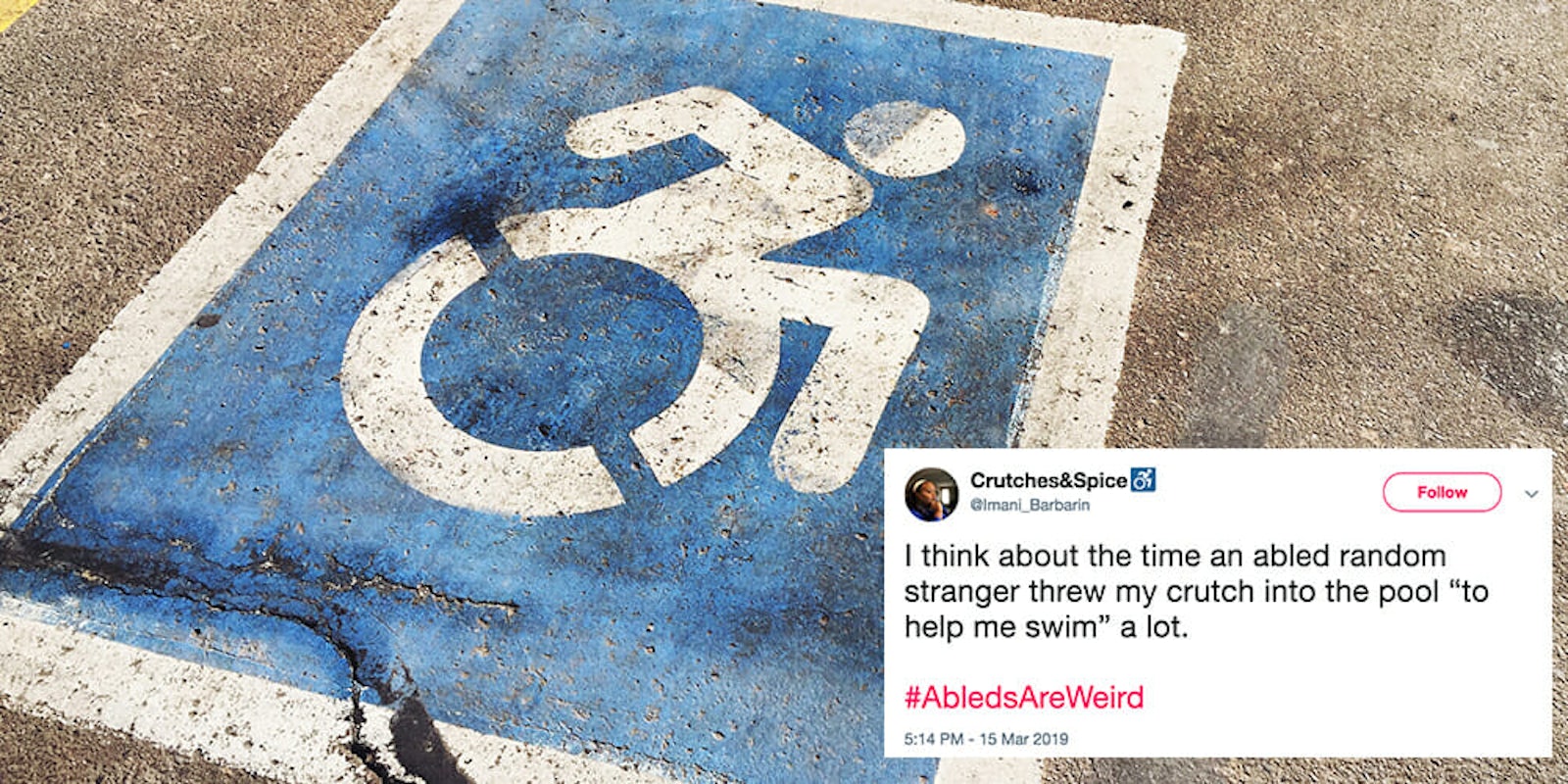Living with a disability isn’t always easy, but sometimes the greatest struggle can come from discrimination from non-disabled people, as the trending hashtag #AbledsAreWeird details. Users by the thousands have shared their experiences this week, shining a spotlight on the uncomfortable, rude, and sometimes just downright bizarre harassment people with disabilities face. Writer and advocate Imani Barbarin created the hashtag last Friday when she shared that a stranger once threw her crutch into the pool to help her learn how to swim. It quickly garnered nearly 9,000 likes as other people with disabilities began sharing their similarly frustrating experiences.
I think about the time an abled random stranger threw my crutch into the pool “to help me swim” a lot. #AbledsAreWeird
— @ImaniBarbarin@disabled.social (@Imani_Barbarin) March 15, 2019
Stories on Twitter outlined how people with disabilities routinely face such invasions of privacy and consent, even if sometimes the non-disabled person at fault means well. Others allow their curiosity and lack of experience with people with disabilities to totally disregard personal boundaries. “…a woman made a beeline to me and, [with] no introduction, asked, ‘Can you have sex?’” wrote photographer Kathryne Husk, and they were hardly surprised; it wasn’t the first time a stranger asked them that.
https://twitter.com/KathryneHusk/status/1107113516262150144
https://twitter.com/eirpaC/status/1106682650452873216
#AbledsAreWeird. They think it’s okay to ask strangers about their medical history because they have a service animal or mobility device, but get indignant if they are asked in return about the results of their last STD test.
— Abrea♿️ (@ItsAbrea) March 16, 2019
https://twitter.com/chronicparent30/status/1106923076724367360
The viral hashtag also highlighted how people with disabilities are constantly fielding health suggestions from acquaintances and strangers, as if they haven’t heard them a million times before.
https://twitter.com/MadMaxFlapper/status/1106825904133529600
https://twitter.com/thalestral/status/1107673640022298625
Neurotypical person: “Lol, I’m sorry I forgot, I’m so ADHD”
— Andrew (@landrewhuffman) March 16, 2019
Me, a human with ADHD: No worries
Me: “Sorry, I forgot, I have been really overwhelmed and didn’t put it in my calendar.”
Same neurotypical person: “Stop using your ADHD as an excuse.”#AbledsAreWeird
Perhaps most horrific of all was how many stories mentioned such mistreatment from medical professionals and educators.
https://twitter.com/WENEEDTOTALK40/status/1106923739416064002
https://twitter.com/cosmicreindrops/status/1106885621740724226
It’s horrifying how many of the stories in #AbledsAreWeird are about educational or medical professionals.
— Jay Rattray (@MsJayTeeR) March 16, 2019
And then they wonder why disabled people don’t trust them.
https://twitter.com/hypo_awareness/status/1106892816645611521
Doctor: Do you want to try this medicine with bad side effects that has never been tested on your illness and I have no real proof it will work but maybe it will?
— Kayla A. K. Jean (@KaylaAKJean) March 17, 2019
Me: No
Doctor: Do you even want to get better?#AbledsAreWeird
Suffice to say, the stories succeeded in making an impact. As #AbledsAreWeird started trending, several non-disabled people began spreading the word about it as a reference for others to learn how to treat (or, perhaps, not treat) people with disabilities. “We can learn to do better by listening, and this hashtag can help you start,” wrote Twitter user @surliestgirl.
Hey, friends, take a stroll through the #AbledsAreWeird posts for a serious education and eye-opener. I’m sure I have done some stupid-ass things when interacting with people with disabilities. We can learn to do better by listening, and this hashtag can help you start.
— Holly Frey (@surliestgirl) March 16, 2019
If you need a reality check as able-bodied person, educate yourself with #AbledsAreWeird.
— Laila Alawa (@lulainlife) March 16, 2019
This hashtag isn’t a joke, it’s about harassment and bullying. World, do better.
Update 5:01pm CT, March 19: The creator of #AbledsAreWeird, writer and advocate Imani Barbarin, told the Daily Dot she was ecstatic her efforts could help people with disabilities feel heard. “I always say that the content I make isn’t for abled people to be comforted in their fear of disability,” Barbarin said, “but for disabled people to feel like they’re less alone.” That was the very reason she created the hashtag in the first place: to build a conversation around their shared experiences. She knew the hashtag’s wording would be particularly important in facilitating that intent. “[I]t flips societal expectations on its head,” she said, “and posits that it is not disabled people that are weird or ‘other’ but a society that constantly treats us as such and doesn’t listen to us.”
READ MORE:


